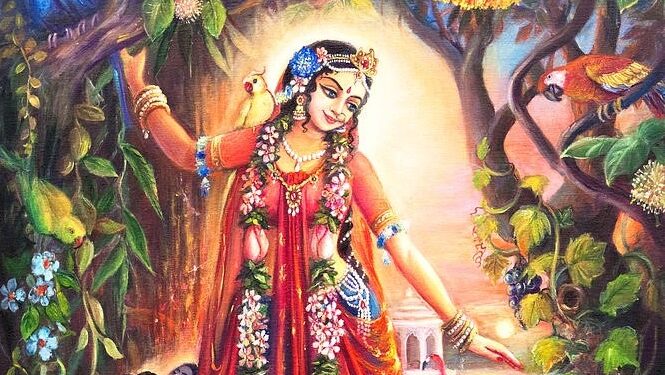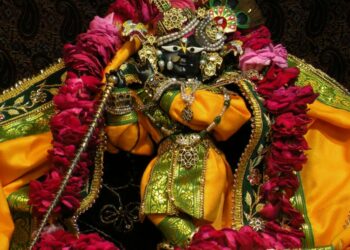Whoever worships Tulasī Devī with her eight names and their meanings-Vṛndā, Vṛndāvanī, Viśvapāvanī, Viśvapūjita, Tulasī, Puṣpasāra, Nandinī, and Kṛṣṇa-jīvanī, and properly sings this hymn of eight verses, acquires the merit of performing an aśvamedha (horse) sacrifice.
Because Tulasī was born on the lunar day of the full moon in the month of Kārttika, Lord Hari prescribed this day for her worship.
Whoever worships her on this day will be freed from all sins and go to Vaikuṇṭha.
Whoever, out of reverence, gives Lord Viṣṇu a Tulasī leaf in the month of Kārttika, will gain the same benefit obtained by giving the gift of ten million cows.
By hearing or recalling the Tulasī hymn, a son will be born to a sonless woman, a wife will be obtained by a wifeless man, health will be restored to a diseased person, freedom will be given to a prisoner, fearlessness will be bestowed upon a terrified person, and salvation will be given to a sinner.
In the Kāṅva-śākhā branch of the Vedas, the method of worshiping and meditating on Tulasī Devī is described. Without invoking the goddess, one can reverentially meditate on her and adore her with sixteen ingredients in the following way:
“Of all flowers, Tulasī is the best. She is worshipable and beautiful, and burns up the fuel of sins like a flame of fire. Of all the goddesses, she is the most sacred. Because no one can compare to her, she is called Tulasī. I worship this goddess who is entreated by all. She is placed on the heads of all, desired by all, and makes the universe holy. She bestows liberation from this world and devotion to Lord Hari. I worship her.” After this meditation and worship, the wise should read her praises and bow down to her.
















